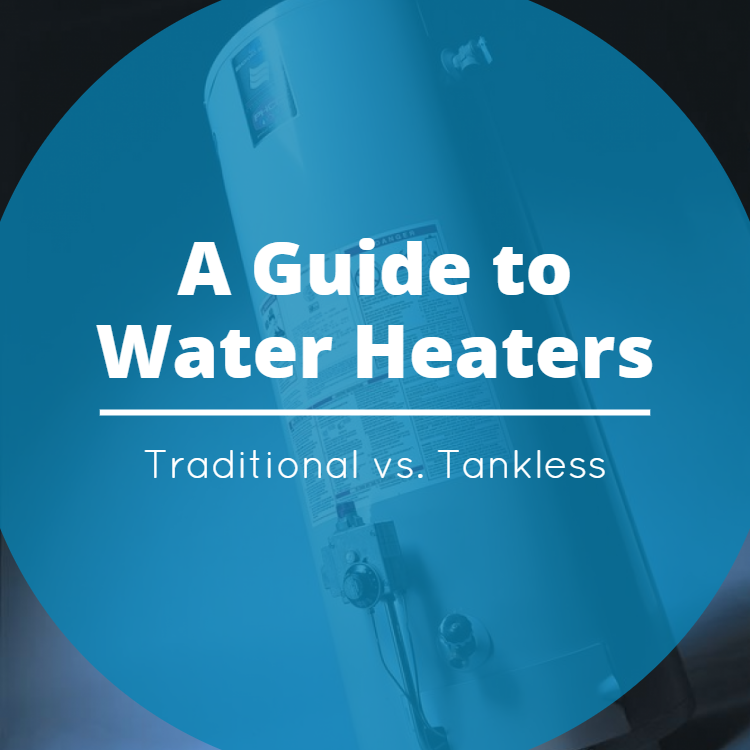A Guide to Water Heaters: Traditional vs. Tankless
 When the temperature starts dropping to 50 degrees in the early mornings and the evenings, a consistent supply of hot water is absolutely necessary to household comfort. Nothing is more frustrating than taking a shower only to discover halfway through that you’ve run out of hot water.
When the temperature starts dropping to 50 degrees in the early mornings and the evenings, a consistent supply of hot water is absolutely necessary to household comfort. Nothing is more frustrating than taking a shower only to discover halfway through that you’ve run out of hot water.
We don’t usually think about how we get our hot water until we no longer have it, but producing hot water takes up a significant amount of your overall household energy (which you end up paying for in utilities bills).
So, are you getting the most out of your water heater? Is it time to switch to a different model? There are many factors to consider.
We’ve gathered information about both conventional storage tank water heaters and tankless water heaters so that you can make an informed decision about what kind of water heater is best for your needs.
Traditional Water Heater
A conventional storage water heater works by releasing hot water from the top of the tank when you turn on the hot water at a faucet. The tank always stays full by allowing cold water to enter the bottom of the tank as the hot water is used.
A home water heater usually stores anywhere from 20 to 80 gallons of water, while commercial water heaters can hold anywhere from 20 to hundreds of gallons.
Storage water heaters are typically powered in two ways, electricity and fuel. The fuel used can be natural gas, propane, or fuel oil. Fuel-fired heaters use a gas burner to heat up the water, while in electric heaters, a current passes through electrical-resistance heating elements at the middle of the tank and at the bottom.
Storage water heaters typically experience some level of standby heat loss. Due to the fact that water is constantly being heated in the tank, energy is wasted even when you don’t have the hot water running.
Though conventional water heaters have a cheaper front cost, they are the most expensive to operate and maintain over time. You should always take into consideration the energy efficiency rating of the heater and its energy factor.
Tankless Water Heater
Tankless water heaters do not operate with the use of a storage tank, hence the name. Therefore, hot water is produced on demand whenever you turn on a tap. Tankless water heaters can run on gas or electricity, but gas models have a higher hot water output.
When a hot water tap is turned on, sensors installed will signal for the unit to ignite itself. Water then travels through the heat exchanger and becomes hot in a matter of seconds. The hot water is produced at a rate of 2 – 7 gallons per minute, and as long as the tap is on a constantly supply of hot water will be delivered.
Tankless water heaters come in a variety of different sizes in order to fulfill your heating needs, and may be installed centrally or at the point of use. This means you can purchase a tankless heater that can heat water for an entire building, or one that works as a remote hot water source for certain appliances (dishwashers, washing machines, hot tubs, etc.)
The best part about tankless water heaters is that, unlike a storage tank, there is no standby heat loss. Since there is no tank of water that needs to be constantly heated, there is no energy wasted.
However, it is important to remember that, with tankless water heaters, your water will not be hot as soon as you turn on your faucet.
Of course, this can be achieved with additional plumbing equipment, but typically, if your tankless heater is several feet away from the appliance you are using, the hot water at the source must travel that several feet to reach your faucet.
The purchase and installation of a tankless water heater is higher than that of a conventional storage tank, but the overall cost of ownership (operation and maintenance) is much lower in the long run.
Cost and efficiency
To measure and compare costs and efficiency of any water heater, the first thing to take into consideration is the unit’s energy factor.
The energy factor indicates a water heater’s overall energy efficiency based upon the amount of hot water produced per unit of fuel consumed over a typical day, according to energy.gov. The higher the energy factor, the more efficient the water heater.
However, the energy factor does not take into account the overall operating costs of a water heater. It’s important when shopping for a water heater to also take into consideration the overall cost of the heater, the cost of fuel to operate, and size and first hour rating.
To calculate energy usage per day, you’ll need to know the cost of fuel by Btu (British thermal unit) or the unit cost of electricity by kilowatt-hour (kWh). For the appropriate equations to calculate daily energy usage (and some handy comparison charts) check out Energy.gov’s article on calculating water heater costs.
For installation and maintenance costs, it is best to contact a qualified contractor. They can help you estimate these costs depending on the model and power system.
If you’re curious about installation and maintenance costs for a new water heater, we can help. Just go to our contact us page and fill out the form with your request or question and we will respond as soon as possible.
If you think you’re ready to make the switch to a tankless water heater in your home, don’t miss out on our tankless water heater rebates. You could save up to $700 on a new tankless water heater. Learn more about this promotionhere.

